- Home
- Bruce, Leo
Case for Three Detectives
Case for Three Detectives Read online
MACBETH: ’Twas a rough night.
LENOX: My young remembrance cannot parallel A fellow to it.
Re-enter Macduff
MACDUFF: O horror ! horror ! horror ! Tongue, nor heart, cannot conceive, nor name thee !
MACBETH and LENOX: What’s the matter?
MACDUFF: Confusion now hath made his masterpiece !
Most sacrilegious murder hath broke open
The Lord’s anointed temple, and stole thence
The life o’ the building.
© 1936 Leo Bruce
Published by
Academy Chicago Publishers
363 West Erie Street
Chicago, Illinois 60610
First printing: August 1980
Second printing: November 1982
Third printing: September 1997
Printed and bound in the U.S.A.
No part of this book may be reproduced in any way without the express written permission of the publisher.
Library of Congress Cataloging-in-Publication Data
Croft-Cooke, Rupert, 1903–
Case for three detectives.
I. Title.
PZ3.C8742Cas 1980 [PR6005.R673] 823’.912 80-17976
ISBN 0-89733-032-3
ISBN 0-89733-033-1 (pbk.)
Case for Three Detectives
CHAPTER 1
I CANNOT pretend that there was anything sinister in the atmosphere that evening. Nothing of the sort that is supposed to precede a crime. Nobody walked about looking furtive, no whispered quarrels were interrupted, no mysterious strangers lurked near the house. Although afterwards, as you may imagine, I went over the events of the day again and again in my mind, I could remember nothing which might have served as a warning, nothing at all extraordinary in anyone’s behaviour. That is why the thing came as such an abominable shock to me.
I remember, of course—I have good cause to remember—that we discussed crime over our cocktails. But we discussed it in general terms, and how could one have guessed that there was any relevance in the discussion? And I could not say for certain who had brought up the subject. Perhaps if I could have done so, if anyone could have done so, it would have helped us later to understand. For that discussion was relevant, appallingly relevant, in a very special sense. As you shall see.
But at the time—well, at the Thurstons’ week-end parties, crime might be discussed, or religion, politics, the cinema, or ghosts. Any topic of general interest which arose was sure to be pretty well threshed out. That was the kind of party which the Thurstons gave, a party at which everyone talked a great deal, shouting opinions which he would afterwards have denied, and trying to shout them as cleverly as possible. I do not mean that it was all rather self-conscious and arty, like those awful parties in London at which women with unpleasant breath advocate free love and nudism. But at the Thurstons’ conversation was enjoyed, and not treated as a tiresome stop-gap between dinner and bridge.
Dr. Thurston himself was no conversationalist, though he enjoyed listening, and could put in an incentive phrase now and again. He was a big, bespectacled man, rather Teutonic in appearance, and in manner, too, for he showed a jolly German simplicity and sentimentality to everyone. He liked pressing his guests to food and drink and cigars, with booming emphasis. He had been the local doctor in that Sussex village, till he married, and although he no longer practised he had kept on the house, because he liked it, and allowed the new practitioner to build afresh. It was understood that Mrs. Thurston had money; at all events they had been very well off since their marriage, and entertained a great deal.
She, too, was amiable, most amiable, but not very intelligent. Although I stayed with the Thurstons many times, and must have spent hours in the same room with Mary Thurston, I cannot recall a single sentence that she uttered. She was stout, and spent a great deal of money on her clothes, a big, blonde, rather painted woman, easy-going and quite unpretentious. I can see her clearly enough, even if I cannot remember words of hers, beaming round on us all, filling quite a wide arm-chair, giggling like a girl at flattery, obviously overflowing with kindness. ‘The Goddess of Plenty’ someone once called her, aptly enough, for as a hostess, from the practical point of view, she was supreme. The food was really exquisite, the house beautifully kept, and Mrs. Thurston had that important gift—a memory for drinks. She was a good woman.
Whoever may have started discussing crime, it was Alec Norris who did most of the talking, though he pretended to be contemptuous of the topic.
“Crime?” he said. “Can’t we talk about anything else? Don’t we get enough of it in books and films? I’m sick to death of this crime crime, crime, wherever you turn.”
Dr. Thurston chuckled. He knew Norris, and knew why he spoke so bitterly. Norris was an unsuccessful writer of novels very different from murder mysteries—rather intense psychological books, with a good deal of sex in them. Dr. Thurston saw his chance of making Norris excited.
“But is it crime in those books?” he asked. “Crime as it really happens?”
Norris might have been a diver on a spring-board. He hesitated for one moment, blinking at Thurston, then he plunged. “No, I’m damned if it is,’,’ he said. “Literary crime is all baffling mystery and startling clues. Whereas in real life, murder, for instance, nearly always turns out to be some sordid business of a strangled servant girl. There are only two kinds of murder which could baffle the police for one second. One is that committed by a man with a victim who cannot be missed—like the recent Brighton murder. The other is the act of a madman, who murders for the sake of murder, without another motive. No premeditated murder could puzzle the police for very long; Where there’s a motive and the victim’s identified, there’s an arrest.”
He paused to swallow the rest of his cocktail. I was watching him, thinking what an odd-looking fellow Alec Norris was—narrow in head and body, with a bony face in which jaw and teeth, cheek-bones and forehead protruded, while the flesh seemed to have shrunk till it barely covered the skull.
Another guest spoke then. Young David Strickland, I think it was. “But an arrest doesn’t always mean a verdict of guilty,” he said. “There have been murderers so desperate that though they knew beforehand they would be suspected and probably charged, they took the chance. They were clever enough not to provide enough evidence.”
I did not look with much interest towards Strickland, for I knew him quite well. He was younger than any of us, a thick-set fellow, fond of sport, particularly of racing. He was apt to try to borrow a fiver from you, but bore no malice if it was refused. He was some sort of protege of the Thurstons, and Dr. Thurston sometimes spoke to his wife of him good-humouredly as ‘your lover, my dear’. There was nothing in that, however, though I could imagine Mary Thurston helping him out of difficulties. Nothing of the gigolo about young Strickland, a hard-drinking, gambling type, fond of smutty stories.
Alec Norris brushed aside his interruption. “The police will find the evidence, when they know their man,” he said, and returned to his condemnation of detective fiction. “It’s all so artificial,” he said. “So unrelated to life. You, all of you, know these literary murders. Suddenly, in the middle of a party—like this one, perhaps—someone is found dead in the adjoining room. By the trickery of the novelist all the guests and half the staff are suspect. Then down comes the wonderful detective, who neatly proves that it was in fact the only person you never suspected at all. Curtain.”
“Have another drink, Alec?”
“Thanks. But I haven’t finished yet. I was going to point out that it has become a mere game—fox and hounds between readers and novelist. Only readers are getting clever nowadays. They don’t suspect the obvious people, as they used to. But i
f the novelist has a character who wasn’t at all the sort of person to have done it, they may just wonder, by analogy. Every one of the minor characters has been used. It has turned out to be the family lawyer, like you, Mr. Williams. The host himself, like you, Thurston. The young friend staying in the house, like you, Townsend,” he glanced in my direction, “or like you, Strickland, or like me. The butler, like Stall, the Vicar, like Mr. Rider, the housemaid, like Enid, the chauffeur, like yours—what is his name?—or the very hostess, like you, Mrs. Thurston. Or else it has been a total stranger who doesn’t appear till Chapter Twenty-two, though that I call cheating. In fact, each of us has been overworked.”
He had us smiling rather uncomfortably now. “Yes, what I said is true,” he ended rather peevishly. “It has become a game, a mere game like chess, this writing of murder mysteries. While in real life it is no game, but something quite simple and savage, with about as much mystery wrapped round it as that piano leg. And that’s why I’ve no use for detective fiction. It’s false. It depicts the impossible.”
Sam Williams answered him. Williams was the Thurstons’ lawyer, and I had met him several times at their house. He was one of those very clean, pink-and-white, cigar-smoking men, whom you see swinging a patent-leathered foot in the corner of a first class railway-carriage. He had thick white hair, always beautifully brushed, a young man’s figure, and an open face. He dressed well, and moved smartly. He had the reputation of being a first-rate solicitor, and I had consulted him more than once.
He said now—“That may be so. But I enjoy the game. It has, as you say, become far more subtle lately, and no one can guess the murderer till the last few pages. But after all, we expect fiction to transcend life, and a murder in a book to be more mysterious than a real one.”
Just then Thurston, who always mixed the cocktails himself, rang for some more gin, and Stall, the butler, answered the bell. I had never liked Stall, and had I been playing what Norris called ‘the game of mystery’, Stall would have been my first guess. There really was something sinister about his lean bald head, and narrow eyes, and silent movements. But he was an excellent servant.
Mary Thurston stopped him, as he was leaving the room, “Tell Fellowes I want to speak to him, will you?” she said, and added to her husband, “It’s about those rats, dear. I’m sure I’ve heard them again. I think they’re in the apple-room. He must do something about it.”
“Well, don’t let him put poison down in case T’ang gets hold of it.” T’ang was Mary Thurston’s Pekingese.
“No. A trap would be best,” she said, and went out into the hall to speak to Fellowes, the chauffeur.
It was a Georgian house, simple and dignified in architecture, with the flat front and four-square look of the period, rows of long and dignified windows, and high carved ceilings. But I was not altogether surprised to hear that Mrs. Thurston had heard rats. I remember thinking it rather silly, but not unlike her, to mention it in front of her guests.
Not that the interior of the house gave the impression of possible rats, or even of mice, it was too well kept and well cleaned. It was only its age which made them seem possible to me. Its rooms were light and centrally heated, its inside walls painted in cream, with vivid water-colours hung on them, its floors parquet, while it had a luxurious array of deep settees and arm-chairs, with gay soft cushions in them, to distract the eye from the reproduction furniture. I remember its air of conventional warmth, light and luxury, as that of a very expensive hotel. In fact, that is what it was all rather like—a good hotel. Nickel taps running hot water in your bedroom, reading-lamps to switch on wherever you were sitting, drinks whenever you wanted them. Most pleasant for a week-end, but rather an insipid background for a longer stay. That’s as near as I can get to a portrayal of it—it seems so long ago, now, that we were all there.
“One more!” Dr. Thurston was begging us, as he went round with the cocktail shaker. “Just half of one!” And we had our glasses filled up.
“You seem to have a down on writers of crime stories,” said Williams, across the hearth to Norris.
“Only because their books conform to type.”
“Have you never thought of writing a crime story yourself?”
The question seemed to startle Norris. “I? No!” he said. “If I ever did anything of the sort it would be a study of the state of mind in a criminal. It wouldn’t be a blasted drawing-room game of clues, and false clues, and alibis; tricks of time and place and method and motive, which have no relationship with real life. I might try one day to depict a man’s agony as he made up his mind whether or not to commit a murder. And his agony afterwards …” he added slowly.
“But surely,” Williams said, “‘Dostoievski did that for all time, didn’t he? In Crime and Punishment, I mean?”
“Nothing is done ‘for all time’,” said Norris sharply; “every murderer is a little different from the rest. Though your crime writer doesn’t seem to realize it.”
Just then the first gong sounded, and we rose to go upstairs to dress. Williams and Norris were still talking as we left the room, though I followed no more of their argument.
I must have been the first, I think, to reach the hall, and I found Mary Thurston finishing her instructions to the chauffeur. Fellowes was a rather good-looking young man of thirty or so. He had one of those keen intelligent faces, with frank eyes and a good profile, which seem to occur often enough among the mechanically-minded of his class. He was well built, too, and standing stiffly in his uniform he made his mistress, in spite of her clever clothes, look rather flabby.
He left her as we emerged, and when Mary Thurston turned towards us, I noticed that she was flushed, and seemed to be controlling emotions such as one would scarcely have thought would be aroused by a discussion of rat-traps. However, she smiled to us, and preceded us up the wide staircase.
CHAPTER 2
I HAVE said that nothing sinister happened during the earlier part of that evening, and it is true. But there was one small incident which I thought, even at the time, was odd. It was not in the least sinister, and might even, at another time, have been thought rather comic.
I dress very quickly. I have never been able to afford a man-servant capable of looking after my clothes, and consequently am accustomed to doing everything myself. I must have been the first to finish changing, and left my room to go downstairs within fifteen minutes of the time when the first gong had been rung.
The house, I have explained, was Georgian, and so simple in plan that one could take it all in at a glance. There were three storeys, and on each floor the corridor ran from end to end of the house, with doors to right and left of it. My own was at the east end of the corridor, and Mary Thurston’s at the west end, while young Strickland, I knew, had the bedroom next to hers. Her husband’s room was opposite to hers.
I had reached the top of the stairs, and was about to descend, when I noticed that the door of Mary Thurston’s room was being opened. Thinking that she, too, had by some means effected a quick change, I waited for her. But it was Strickland who began cautiously to emerge. When he saw me standing there he made a clumsy effort to return to the room, but, realizing that I had seen him, he seemed to think better of it, and walked out as boldly as possible. He even gave me a brief nod as he entered his own room.
I went on downstairs wishing that I had not paused, since it might have appeared that I was spying. It was embarrassing, too, to have seen that. And I found myself wondering what might be the relationship between these two, the ageing, stout, motherly woman, and the thick-set, hard-drinking young gambler. Whatever it might be, it was not a love-affair, of that I was certain.
Downstairs I found the Vicar, who, I gathered, had been invited to dinner. I was a little dismayed to find him sitting beside the fire in the lounge, for I realized that I should be alone for some little time with him. He sat bolt upright on a straight-backed chair, his hands on his bony knees, and his eyes—after he had greeted me—blinking solemnly at
the fire.
I had met Mr. Rider before, of course, and never without embarrassment. This little, wiry, staring man was quite out of place in the Thurstons’ cheerful house—in more senses than one a skeleton at the feast. His very appearance made him inappropriate. He was bald, and his cheeks were yellow, and his collars too large for his thin neck. His clothes were always untidy, and sometimes rather soiled, for he was a bachelor and depended on a village woman for service in his draughty Vicarage. But it was his stare which used to make me uncomfortable. He had a trick of fixing his eyes on one, then apparently forgetting himself, so that for perhaps five or even ten minutes, one remained under scrutiny. He had dark, round, surprised eyes, in deep sockets.
His reputation was unusual, too. His puritanism was ferocious. Towards those of his parishioners whose way of living was supposed to be lax, his attitude was merciless. A number of stories were current in the district of his uncompromising warfare against what he called ‘sins of the flesh’. It was said of him that once, meeting a pair of rustic lovers walking in the fields on a Sunday afternoon, he had lectured them so severely that they had actually untwined themselves (a feat which would not have seemed easy to anyone who had observed the complications of circling arm, yielding waist, knotted fingers, and clutched shoulder), and hurried home, guiltily isolated. He had preached violently at an unfortunate farmer’s wife who had come to one of his services with a dress cut a trifle lower at the neck than was customary, and his manner when he was obliged to conduct marriage services was supposed to be unwilling and curt.
At the Thurstons’ he usually spoke very little, unless he was roused, and I gathered that he was invited out of kindness, for neither the Doctor nor May Thurston believed that he had enough to eat at the Vicarage.
I made one or two attempts to converse with him but was answered only by absent monosyllables. Suddenly, however, he turned to me.
“Mr. Townsend,” he said, “I want to ask you a question.”

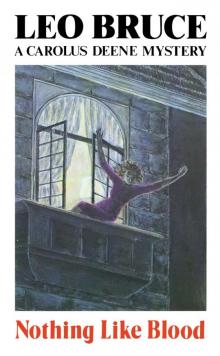 Nothing Like Blood
Nothing Like Blood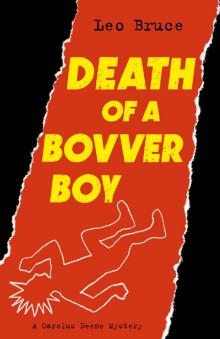 Death of a Bovver Boy
Death of a Bovver Boy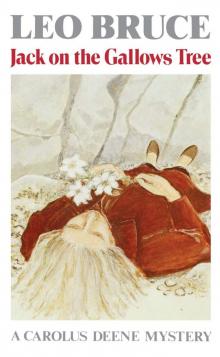 Jack on the Gallows Tree
Jack on the Gallows Tree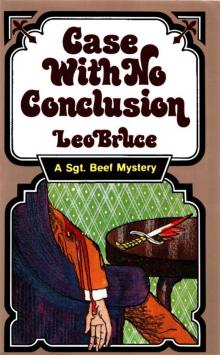 Case with No Conclusion
Case with No Conclusion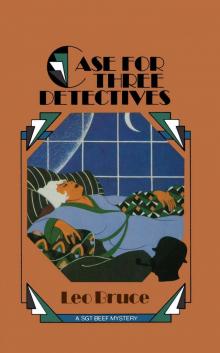 Case for Three Detectives
Case for Three Detectives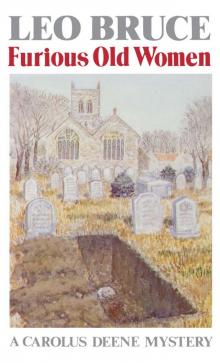 Furious Old Women
Furious Old Women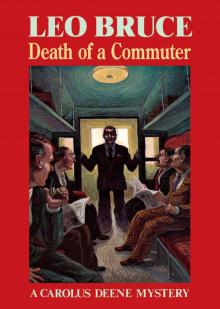 Death of a Commuter
Death of a Commuter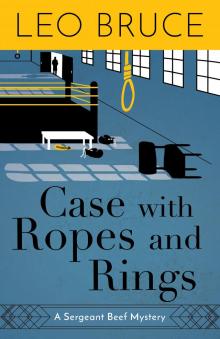 Case with Ropes and Rings
Case with Ropes and Rings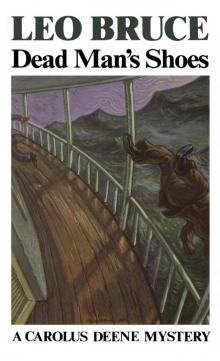 Dead Man’s Shoes
Dead Man’s Shoes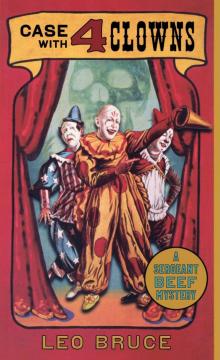 Case with 4 Clowns
Case with 4 Clowns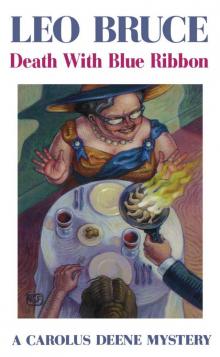 Death with Blue Ribbon
Death with Blue Ribbon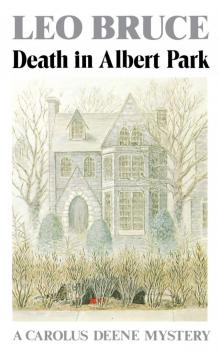 Death in Albert Park
Death in Albert Park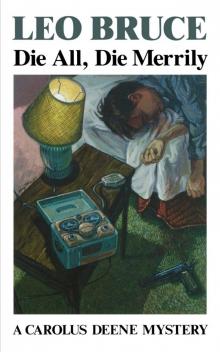 Die All, Die Merrily
Die All, Die Merrily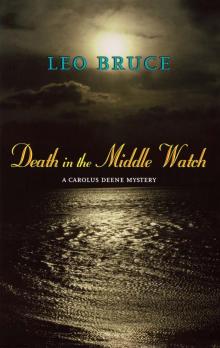 Death in the Middle Watch
Death in the Middle Watch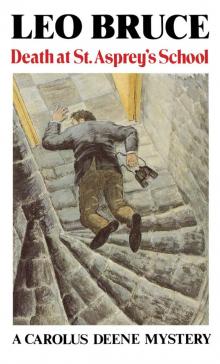 Death at St. Asprey’s School
Death at St. Asprey’s School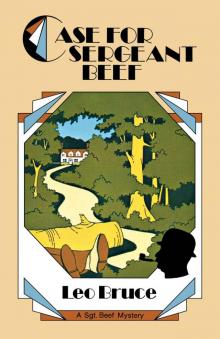 Case for Sergeant Beef
Case for Sergeant Beef